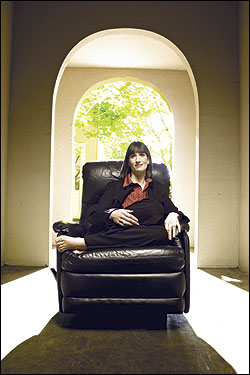When soldiers come back from Iraq, they are, like soldiers returning from any war, changed. But what exactly they’ve experienced and how they feel about it is something their families—even their spouses—might never know. They don’t want to pollute the precious home they’ve been longing for, for example, by breaking the news that they’ve killed someone, perhaps unknowingly a civilian, perhaps even a child.
That’s where Michele Klevens comes in. “My job is to hear all the bad stuff,” she says. Klevens is the lead psychotherapist at the Veterans Affairs’ Deployment Health Clinic in Seattle, set up to serve returning soldiers from Iraq and Afghanistan. Like many of her colleagues at the VA, she is working a job at the less lucrative end of her profession out of a sense of commitment to the people who fight our wars. Born in the 1960s and having watched the shabby treatment of those returning from Vietnam, she developed an early empathy for veterans. She’s been working with them now on and off for 14 years. Klevens radiates compassion and unjaded sincerity while bearing daily witness to some of the darkest truths there are, as told by the people who lived them. “The first thing I tell them is that it’s normal,” she told a gathering of soldiers’ family members a few months ago. “Killing was a rush—that’s normal.”
Over coffee in Madison Valley, near an office she maintains for private patients, Klevens explains the typical pattern for soldiers. In war, she says, “there are split-second decisions. It really comes down to kill or be killed. When a person is in a position like that, how he or she feels about it plays no role.” When the soldier comes home, however, “there’s a reckoning” as the individual begins to think about actions that are “outside the range of what most of us are ever asked to do.”
Used to burying their feelings in combat, soldiers often initially feel numb. Or they feel hatred for themselves. Klevens recounts that one of her patients told her recently, “I’ve had to do things that didn’t fit with my belief system, my faith, or my understanding of the world. I don’t like who I’ve become.”
What do you do with that? Klevens says, “The biggest gift I can offer these people is to model acceptance for what they did, given the circumstances they were in at the time. I’m not going to be shocked. I’m not going to call the war crimes commission.” Paradoxically, her warmth and lightness are possible through an understanding of humanity’s underbelly, that “in the right circumstances, all of us would do whatever it took to survive.”
Her clients can feel her empathy. One of them recently told her, “I need to sit across from you and feel understood and accepted for 50 minutes, and that carries me through the week.”
Klevens, for her part, says she is replenished by her work, despite the ugliness it exposes her to. She knows she has a knack for what she does. “The reason I am good at what I do is because I bring my whole person to sit with another person in a room. Whatever happens when you invite someone to be who they are is kind of an amazing thing.” VA Puget Sound, 1660 S. Columbian Way (and other locations), 206-762-1010, www.puget-sound.med.va.gov.
Michele Klevens’ Picks
- Best Hangout:
- The courtyard at Cafe Flora in Madison Valley. It’s a serene indoor/outdoor environment that feels lovely to me.”
- Best Support for Veterans Other than the VA:
- “The vets from prior conflicts have really showed up for these returning folks. They’ve wanted to share the message: ‘We’ve been to war, too. We’re here for you.’ I have to also admire the military and their pairing with us [to provide health services for returning troops]. They have come so far in accepting that people struggle with readjusting to civilian life. The pairings at Fort Lewis and Madigan [Army Medical Center] is groundbreaking and brand-new.”
- Best Way to Approach a Returning Soldier:
- Something like, “Thank you for what you’ve done.” If you see a soldier at a party, it’s OK to express an interest in what that person has experienced, along the lines of: “Sometime, when you’re back a while, if you ever want to talk about it, I’m interested in hearing what your year was like.” But “when soldiers come back and go to parties, they don’t necessarily want to talk about Iraq. . . . Sometimes they just want to eat their hamburger.”
- Best thing About the VA Not Generally Known:
- “We welcome well people there, too. There’s a library there [on the Beacon Hill campus]. There’s a tax-free canteen. There’s a courtyard. It’s a beautiful setting.”









